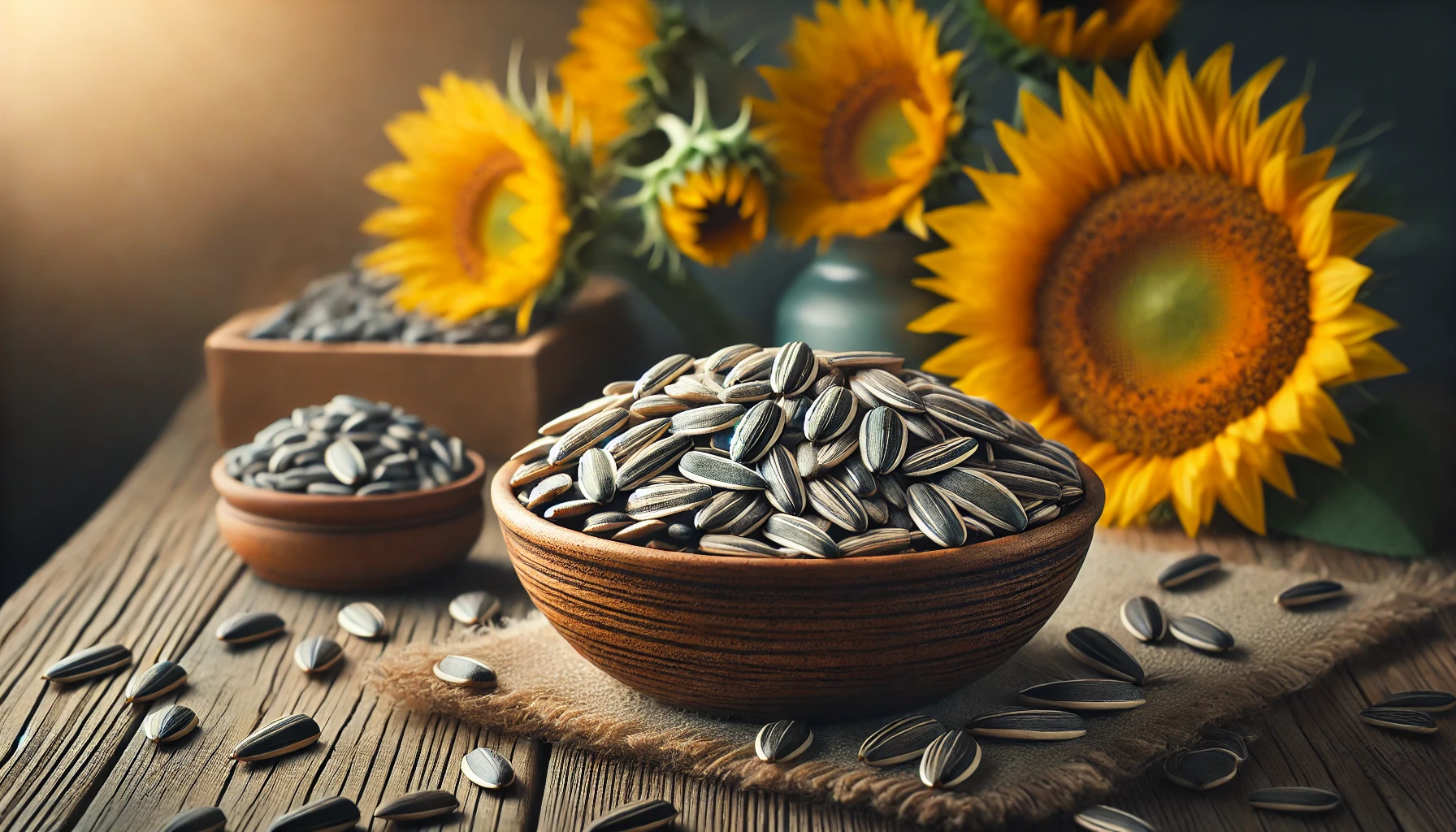Sunflower seeds have long been celebrated for their versatility and health benefits. These tiny, nutrient-dense seeds are derived from the sunflower plant and have become a staple in diets worldwide. Whether enjoyed as a snack, added to recipes, or used in health products, sunflower seeds offer a plethora of benefits that cater to various dietary needs.
What Are Sunflower Seeds?
Sunflower seeds are the edible kernels of the sunflower plant (Helianthus annuus). Found within the flower’s large heads, these seeds are typically encased in black-and-white striped shells. There are two main types of sunflower seeds: oilseed and non-oilseed varieties. While oilseed types are used primarily for extracting sunflower oil, the non-oilseed varieties are consumed as snacks or incorporated into various dishes.
Rich in vitamins, minerals, and healthy fats, sunflower seeds have become a favorite for those seeking a nutritious boost in their diet.
Nutritional Value of Sunflower Seeds
Sunflower seeds are packed with essential nutrients, making them a valuable addition to any diet. Just a small handful can provide a significant portion of your daily recommended intake of several key vitamins and minerals. Here’s a breakdown of their nutritional profile:
- Protein: A great plant-based protein source.
- Healthy Fats: Rich in unsaturated fats, particularly linoleic acid.
- Vitamins: High in vitamin E, a powerful antioxidant.
- Minerals: Contain magnesium, selenium, and zinc.
- Fiber: Promotes healthy digestion and helps manage cholesterol levels.
This combination of nutrients contributes to sunflower seeds’ ability to support overall health, including heart health and immune function.
Health Benefits of Sunflower Seeds
Heart Health
One of the most notable benefits of sunflower seeds is their positive impact on heart health. They are rich in unsaturated fats, which help lower bad cholesterol levels and reduce the risk of cardiovascular disease. Additionally, the seeds contain phytosterols, compounds known to support healthy cholesterol levels.
Boosting Immune Function
The high selenium content in sunflower seeds is crucial for a healthy immune system. Selenium acts as an antioxidant, protecting cells from damage and supporting the body’s defense mechanisms. Combined with zinc, another immune-boosting mineral found in sunflower seeds, these nutrients help maintain a robust immune response.
Supporting Skin Health
Thanks to their rich vitamin E content, sunflower seeds promote healthy, glowing skin. Vitamin E helps combat free radicals that contribute to aging and skin damage. Regular consumption of sunflower seeds can provide the nutrients your skin needs to stay radiant.
Managing Blood Sugar Levels
Sunflower seeds have a low glycemic index, which helps in stabilizing blood sugar levels. The fiber and protein content work together to slow down the release of sugar into the bloodstream, making them a suitable snack for individuals managing diabetes.
Culinary Uses of Sunflower Seeds
Raw and Roasted Snacks
Sunflower seeds are most commonly enjoyed as a snack, either raw or roasted. Their crunchy texture and nutty flavor make them a satisfying and healthy option for curbing hunger between meals. They can be lightly salted or spiced for added flavor.
Baking and Cooking
Sunflower seeds add a delightful crunch and nutritional boost to baked goods like bread, muffins, and cookies. They can also be sprinkled over salads, yogurt, or oatmeal for extra texture and flavor.
Sunflower Butter
For those with nut allergies, sunflower butter is a fantastic alternative to peanut or almond butter. It offers the same creamy texture and rich taste, making it perfect for spreading on toast or incorporating into recipes.
How to Incorporate Sunflower Seeds into Your Diet
Adding sunflower seeds to your daily routine is simple and versatile. Here are some easy ways to enjoy them:
- Smoothie Topping: Sprinkle a handful over your favorite smoothie for a nutrient boost.
- Trail Mix: Combine sunflower seeds with dried fruits and nuts for a healthy snack.
- Soup Garnish: Add a crunch to your soups or stews with roasted sunflower seeds.
- Energy Bars: Use them as a key ingredient in homemade granola or energy bars.
Are Sunflower Seeds Good for Weight Management?
Sunflower seeds can be a great addition to a weight management plan when consumed in moderation. They are high in healthy fats and protein, which promote satiety and help control cravings. However, due to their calorie density, portion control is essential to avoid overconsumption.
Sunflower Seeds and Sustainability
The production of sunflower seeds is considered environmentally friendly, as sunflowers are hardy plants that require minimal resources. They are often used in crop rotation to improve soil health, and every part of the plant can be utilized, from the seeds to the oil and even the husks, which can be composted.
Storing Sunflower Seeds for Freshness
To ensure the best flavor and nutritional quality, proper storage is essential. Here’s how to keep sunflower seeds fresh:
- Airtight Containers: Store seeds in an airtight container to protect them from moisture and air exposure.
- Cool, Dark Place: Keep them in a pantry or refrigerator to prolong their shelf life.
- Avoid Direct Sunlight: Exposure to heat and light can cause the seeds to go rancid more quickly.
Potential Allergies and Side Effects
While sunflower seeds are generally safe for most people, some individuals may experience allergic reactions. Symptoms can include itching, swelling, and difficulty breathing. Additionally, excessive consumption of sunflower seeds may lead to weight gain due to their high calorie content, so moderation is key.
FAQs
What is the best way to eat sunflower seeds?
Sunflower seeds can be eaten raw, roasted, or as part of various dishes. Their versatility makes them a popular choice for snacks and recipes.
Are sunflower seeds a good source of protein?
Yes, sunflower seeds are an excellent plant-based protein source, making them suitable for vegetarians and vegans.
Can sunflower seeds help with weight loss?
When consumed in moderation, sunflower seeds can support weight loss by promoting satiety and reducing cravings.
How should sunflower seeds be stored?
Store sunflower seeds in an airtight container in a cool, dark place, such as a pantry or refrigerator, to maintain freshness.
Are sunflower seeds safe for children?
Sunflower seeds are safe for children when consumed in appropriate portions. However, ensure young children are supervised to avoid choking hazards.
What is the difference between raw and roasted sunflower seeds?
Raw sunflower seeds have a milder flavor, while roasted seeds offer a crunchier texture and a nuttier taste. Both are nutritious but roasting may slightly reduce their vitamin content.
Can sunflower seeds trigger allergies?
Although rare, sunflower seed allergies can occur. Symptoms may include itching, swelling, or more severe reactions.
Conclusion
Sunflower seeds are a versatile and nutritious addition to any diet, offering numerous health benefits and culinary uses. From supporting heart health to promoting glowing skin, these small seeds pack a powerful punch. Whether enjoyed as a snack, incorporated into recipes, or used as a butter alternative, sunflower seeds are a delightful way to enhance your overall well-being.






